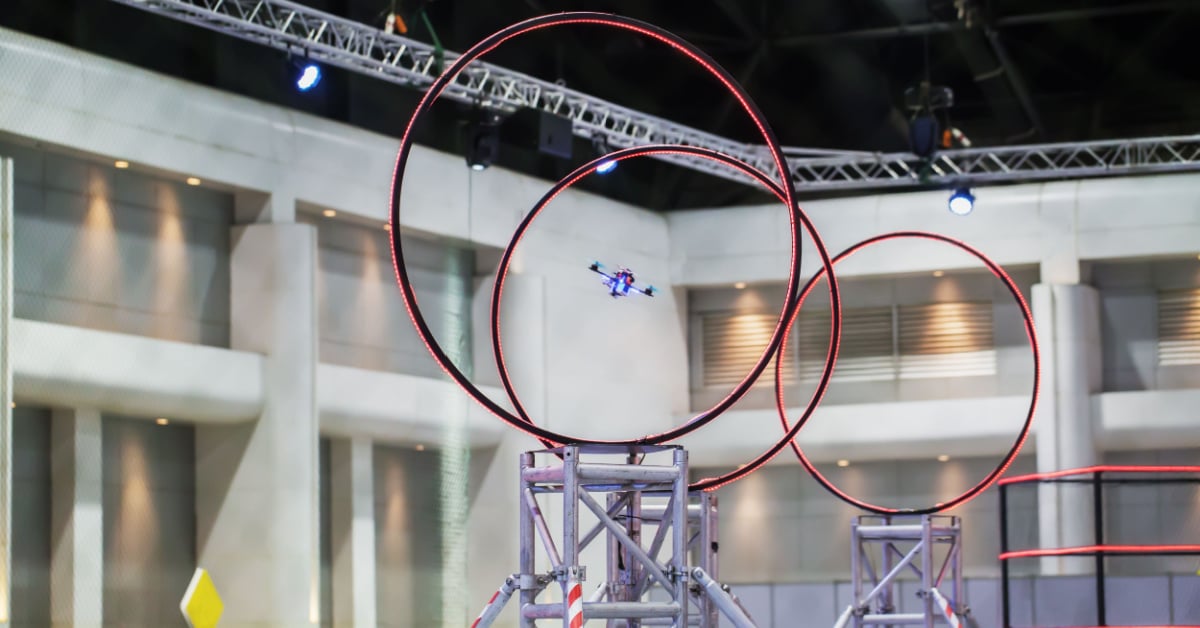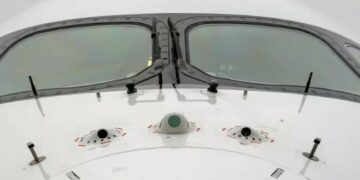
A fully autonomous flight AI has steered a drone through a racetrack faster than human pilots in the fledgling sport of first-person view (FPV) drone racing.
Built by researchers in Switzerland, the AI named Swift has won several races against human champions and achieved the fastest time on the pre-defined track.
With a field of competitors who look like they could be in dire need of sunlight, drone racing reached about 320 million households globally in its 2022-2023 season. News outlets have even suggested the nascent sport could eventually lead to applications in battlefield warfare.
A team of researchers led by Elia Kaufmann, a PhD student at the University of Zurich, developed a system that combines deep reinforcement learning (RL) in simulation with data collected in the physical world.
A research paper published in Nature said: “Reaching the level of professional pilots with an autonomous drone is challenging because the robot needs to fly at its physical limits while estimating its speed and location in the circuit exclusively from onboard sensors.”
Swift uses a combination of learning-based and traditional algorithms to map onboard sensory readings to control commands, the paper said. The mapping comprises of an observation policy, which distils high-dimensional visual and inertial information into “a task-specific low-dimensional encoding,” and a control policy that transforms the encoding into commands for the drone.
“Notwithstanding the remaining limitations and the work ahead, the attainment by an autonomous mobile robot of world-champion-level performance in a popular physical sport is a milestone for robotics and machine intelligence. This work may inspire the deployment of hybrid learning-based solutions in other physical systems, such as autonomous ground vehicles, aircraft and personal robots, across a broad range of applications,” the researchers said.
In an accompanying article, Guido de Croon, professor of aerospace engineering at the Netherland’s Delft University of Technology, said further developments would be required to realize the full potential of the technology.
“The authors’ tests took place in a controlled indoor environment, but real drone races are held in varying environments, both indoors and outdoors. To beat human pilots in any racing environment, the drone will have to deal with external disturbances such as the wind, as well as with changing light conditions, gates that are less clearly defined, other racing drones and many other factors – all of which pose sizeable challenges to existing AI techniques,” he said.
Nonetheless, the likelihood is that piloted drones will start to perform significantly better than humans.
“Given that drones acquire sensing information more rapidly than do human pilots, who rely on delayed images, drones will no doubt eventually beat humans under these difficult conditions as well. The future could well turn, then, to ever-faster drone races that pit autonomous drones against each other – a development that will keep pushing the boundaries of this widely relevant technology,” De Croon added. ®
- SEO Powered Content & PR Distribution. Get Amplified Today.
- PlatoData.Network Vertical Generative Ai. Empower Yourself. Access Here.
- PlatoAiStream. Web3 Intelligence. Knowledge Amplified. Access Here.
- PlatoESG. Automotive / EVs, Carbon, CleanTech, Energy, Environment, Solar, Waste Management. Access Here.
- PlatoHealth. Biotech and Clinical Trials Intelligence. Access Here.
- ChartPrime. Elevate your Trading Game with ChartPrime. Access Here.
- BlockOffsets. Modernizing Environmental Offset Ownership. Access Here.
- Source: https://go.theregister.com/feed/www.theregister.com/2023/08/31/ai_drone_racing/
- :has
- :is
- a
- About
- achieved
- acquire
- across
- added
- Aerospace
- aerospace engineering
- against
- ahead
- AI
- aircraft
- algorithms
- All
- an
- and
- any
- applications
- ARE
- article
- AS
- At
- authors
- autonomous
- autonomous drones
- Battlefield
- BE
- because
- Better
- both
- boundaries
- broad
- but
- by
- challenges
- challenging
- Champions
- changing
- clearly
- CO
- combination
- combines
- competitors
- comprises
- conditions
- control
- controlled
- could
- data
- deal
- deep
- defined
- Delayed
- deployment
- developed
- Development
- developments
- difficult
- dire
- do
- doubt
- drone
- Drones
- each
- Economist
- Engineering
- Environment
- environments
- Ether (ETH)
- Even
- eventually
- exclusively
- existing
- external
- factors
- faster
- fastest
- field
- flight
- For
- from
- full
- fully
- further
- future
- Gates
- given
- Globally
- Ground
- Have
- he
- Held
- HTTPS
- human
- Humans
- Hybrid
- images
- in
- In other
- Indoor
- information
- inspire
- Intelligence
- into
- ITS
- jpg
- Keep
- lead
- learning
- Led
- less
- Level
- light
- like
- likelihood
- limitations
- limits
- location
- Look
- look like
- machine
- many
- map
- mapping
- May..
- milestone
- million
- Mobile
- more
- Named
- nascent
- Nature
- Need
- needs
- Netherland
- news
- no
- notwithstanding
- of
- on
- Onboard
- Other
- outdoors
- Outlets
- Paper
- perform
- performance
- personal
- phd
- physical
- piloted
- Pilots
- PIT
- Place
- plato
- Plato Data Intelligence
- PlatoData
- policy
- Popular
- potential
- professional
- Professor
- published
- Pushing
- racing
- range
- rapidly
- reached
- reaching
- real
- realize
- reinforcement learning
- relevant
- rely
- remaining
- required
- researchers
- robot
- robotics
- robots
- s
- Said
- Season
- sensors
- several
- significantly
- simulation
- Solutions
- speed
- Sport
- start
- Student
- such
- sunlight
- SWIFT
- switzerland
- system
- Systems
- team
- techniques
- Technology
- tests
- than
- that
- The
- The Future
- then
- These
- they
- this
- Through
- time
- to
- took
- track
- traditional
- transforms
- TURN
- under
- university
- uses
- Vehicles
- View
- WELL
- which
- while
- WHO
- widely
- will
- wind
- with
- Won
- Work
- world
- would
- zephyrnet
- Zurich










